Applied econometrics lecture 16 Differences in differences
1/29
Earn XP
Description and Tags
Name | Mastery | Learn | Test | Matching | Spaced |
|---|
No study sessions yet.
30 Terms
Bank run example overview
Assumption is that everything else would be equal
Only thing that changes in these two parts is lending policy
Therefore can compare effects of treatment (8th as control & 6th as treatment - crisis lending)
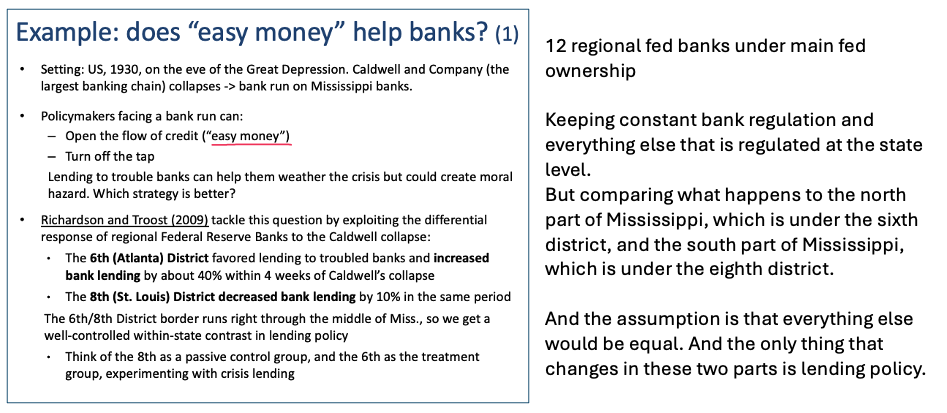
8 months into crisis
More banks open in 8th than 6th
However more were open in 8th to begin with
we have to use Difference in difference to adjust for this
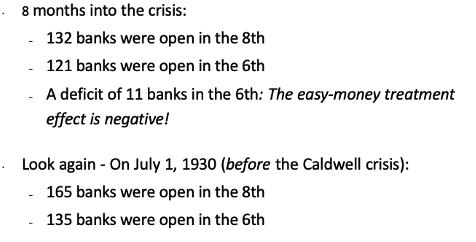
DD additive model
The heart of the DD setup is an additive model for potential outcomes in the no-treatment state:
Yd,t (0) = βd + γt
Yd,t (0)
the potential outcome describing what happens in district d and period t in the absence of an intervention
βd
District effect
Certain districts on average have more or fewer banks
Time-invariatnt
γt
Year effect
something at national level affecting no. banks
Common period
DD for banks
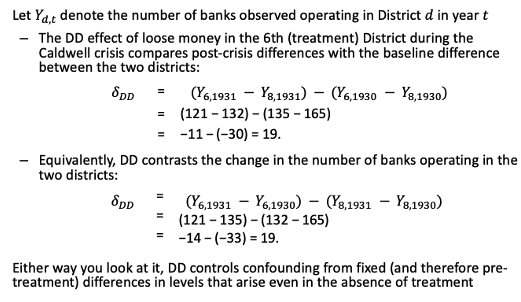
Treatment effect with DD

δDD - treatment effect

δDD
Treatment effect
Treatment effect on banks - maths
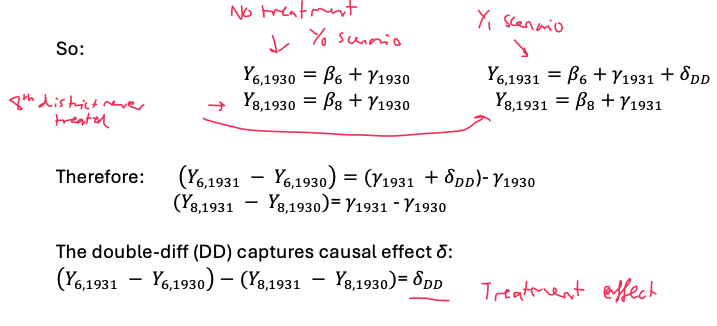
β drop out as same district in both years
γ drops out when comparing both districts as same year

DD banks treatment effect - graph
We assume that treated would evolve like untreated if no treatment - counterfactual
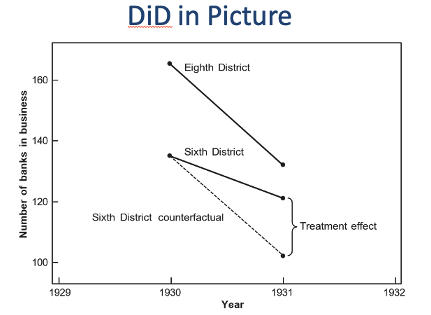

DD and causal effect - banks
Difference = 181 (no. of wholesale firms)
Difference = 81 (no. of wholesale sales)
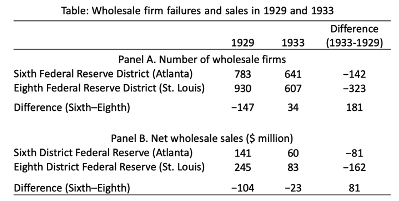
DD assumption - parallel outcome trends
Assume to generate counterfactual
Cant be tested in reality
But we can test whether the outcome evolves in parallel in periods that are not treated
– Pre-trends testing
– Both treated or both untreated
DD extendin time periods
time period extended to compare pre and post treatment
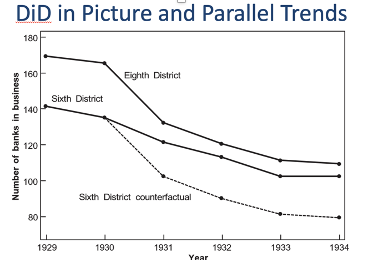
Regression to test counterfactual

TREATd - dummy for district effects (1 if 6th)
POSTt - dummy for post treatment years (1 if post)
δrDD - coefficient on interaction term of POST and TREAT to isolate treatment effects (regression treatment effects)

δDD vs δrDD
With 2 periods they coincide (are equal)
With more periods δrDD is more precise than simple 4 number equation
rDD allows for fact that additive model fits imperfectly


δrDD
Regression treatment effect
– generates SEs (but beware of serial correlation)
– facilitates specification testing
– Can add controls
Min wage Krueger DiD example overview
in 1992 New Jersey raised its minimum wage from $4.25 to $5.05
They use a DiD comparing change in employment in fast food restaurants in NJ to that in neighboring Pennsylvania , where the Min wage was flat at $4.25
Min wage Krueger DiD example graph
Pre treatment - both states very similar distribution of wages
Post treatment - NJ has higher min wage + no increase in PA
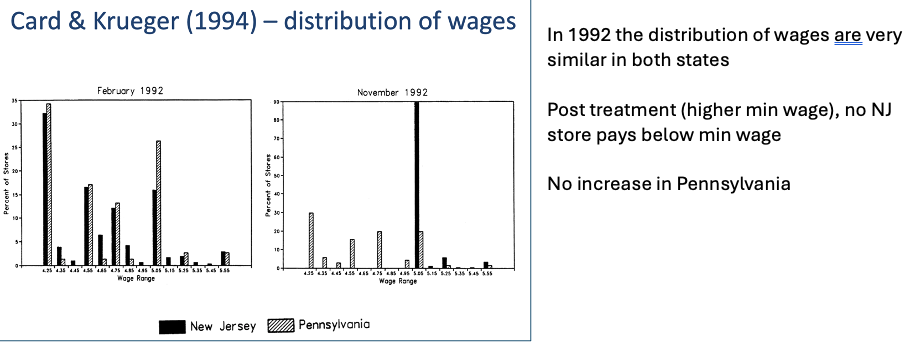
Min wage Krueger DiD example econometrics
Min wage increased employment → against standard theory
statistically insignificant
Evolution before and after arent parallel + only 2 states used
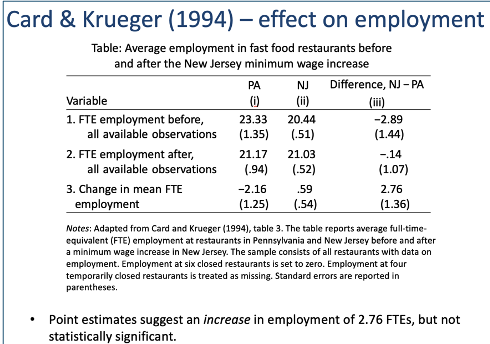
Min wage Krueger DiD example findings explained
L market no perfectly competitive
monopsonistic
Hiring new woker brings profit but w increases
increases costs a lot
if Min w introduced then w has to rise anyway so firm hires more
Two way fixed effects model (TWFE)
Extends regression to include 50 states & 13 years (not just 2 like before)
Regression compacted to look like additive model from before → from LSD (when all dummies shown)
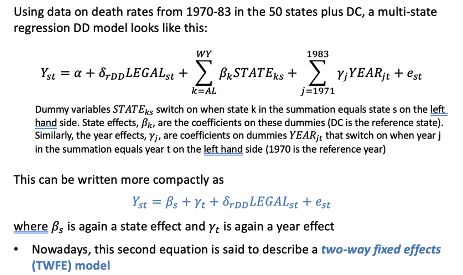
Clustered standard errors
Clustered standard errors extend the OLS variance formula to allow (Yit , Xit) to be correlated across observations in the same “cluster”
The assumption is that each cluster is sampled independently
If we cluster at the individual level (i), then we allow for Yi1 and Yi2 to be dependent, but assume (Yi1, Yi2) is independent of (Yj1, Yj2) for j ≠ iC
Clustered standard errors and panel data
At minimum cluster at the individual level to allow for autocorrelation.
Are clustered standard errors reliable when small?
No
<20
the number of “effective observations” (used for CLT) is the number of clusters
Relaxing the common trends assumption
With many states (β) and years (γ) we can relax the common trend assumption
We allow for seperate linear trends for each state (θk)
Regression with state specific trends
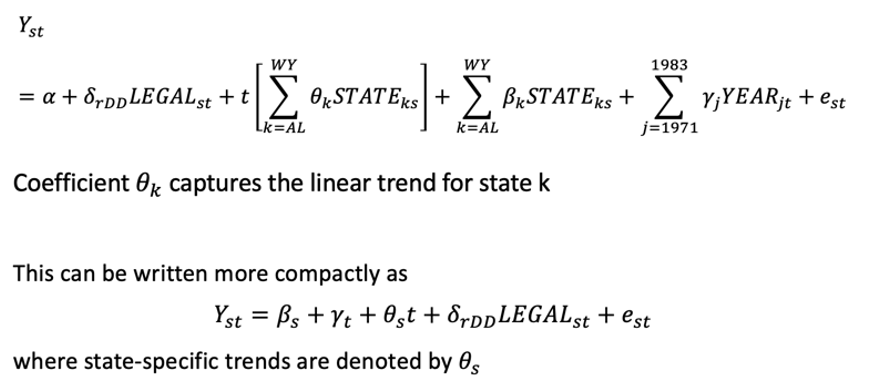

Ideal parallel trends scenario
Effect of treatment very visible
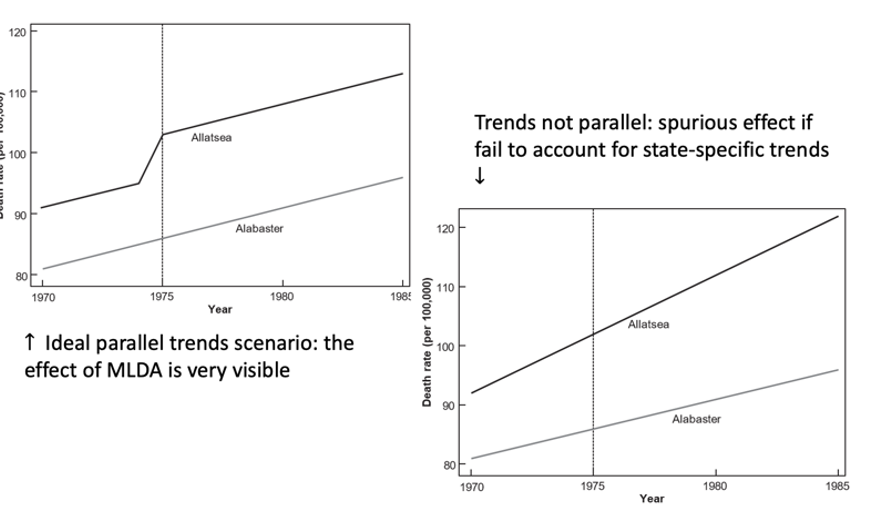
Effect of (minimum legal drinking age) MLDA very visible

Non parallel trends scenario
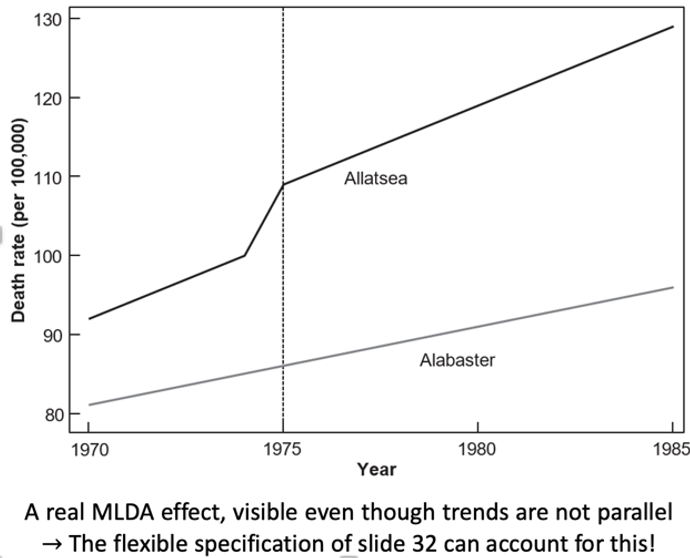

Dynamic treatment effect